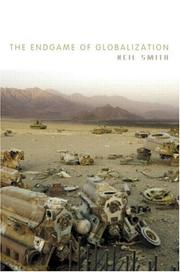| Listing 1 - 10 of 46 | << page >> |
Sort by
|
Book
ISBN: 9780820330990 082033099X 1282553534 0820335908 Year: 2008 Publisher: Athens : University of Georgia Press,
Abstract | Keywords | Export | Availability | Bookmark
 Loading...
Loading...Choose an application
- Reference Manager
- EndNote
- RefWorks (Direct export to RefWorks)
In Uneven Development, a classic in its field, Neil Smith offers the first full theory of uneven geographical development, entwining theories of space and nature with a critique of capitalist development. Featuring pathbreaking analyses of the production of nature and the politics of scale, Smith's work anticipated many of the uneven contours that now mark neoliberal globalization. This third edition features an afterword updating the analysis for the present day.
Economic development. --- Regional economic disparities. --- Economic geography. --- Capitalism. --- Space in economics. --- Développement économique --- Disparités économiques régionales --- Géographie économique --- Capitalisme --- Espace (Economie politique) --- Développement économique --- Disparités économiques régionales --- Géographie économique --- Capitalism --- Economic development --- Economic geography --- Regional economic disparities --- Space in economics
Book
ISBN: 0631175644 Year: 1991 Publisher: Oxford Blackwell
Abstract | Keywords | Export | Availability | Bookmark
 Loading...
Loading...Choose an application
- Reference Manager
- EndNote
- RefWorks (Direct export to RefWorks)
Economic development --- Regional economic disparities --- Economic geography --- Capitalism --- Space in economics --- Spatial economics --- Economics --- Regional economics --- Market economy --- Profit --- Capital --- Geography, Economic --- World economics --- Geography --- Commercial geography --- Differentiations, Regional economic --- Disparities, Regional economic --- Economic disparities, Regional --- Imbalances, Regional economic --- Unequal economic development --- Variations, Regional economic --- Economic zoning --- Regional disparities --- Regional planning --- Development, Economic --- Economic growth --- Growth, Economic --- Economic policy --- Statics and dynamics (Social sciences) --- Development economics --- Resource curse --- Capitalism. --- Economic development. --- Economic geography. --- Regional economic disparities. --- Space in economics. --- Geografie --- Economische geografie --- Ontwikkeling.

ISBN: 0521475708 0521475171 0511053126 0511149557 1139163892 0511009763 9780511009761 051100978X 9780511009785 9780511149559 9781139163897 9780521475174 9780521475709 Year: 1999 Publisher: Cambridge Cambridge University Press
Abstract | Keywords | Export | Availability | Bookmark
 Loading...
Loading...Choose an application
- Reference Manager
- EndNote
- RefWorks (Direct export to RefWorks)
Chomsky has had a major influence on linguistics, psychology, and philosophy. In this rigorous yet accessible account of Chomsky's work, Neil Smith analyses Chomsky's key contributions to the study of both language and the mind. He gives a detailed exposition of Chomsky's linguistic theorizing, and examines the ideas for which he is best known. Smith discusses the psychological and philosophical implications of Chomsky's work, and argues that he has fundamentally changed the way we think of ourselves. Smith examines Chomsky's political ideas and how these fit intellectually with his scholarly work. The final chapter spells out the themes - rationality, creativity and modularity - that unite the disparate strands of his vast output. Throughout, Smith explores the controversy surrounding Chomsky's work, and explains why he has been both adulated and vilified.
800 --- 800 Taalwetenschap. Taalkunde. Linguistiek --- Taalwetenschap. Taalkunde. Linguistiek --- Noam Chomsky. --- Linguistics --- Linguistic science --- Science of language --- Language and languages --- Chomsky, Noam. --- Chomsky, Noam A. --- Linguistics. --- Linguïstiek. --- Chomsky, Noam --- Chomsky, Abraham Noam --- Arts and Humanities --- Philosophy --- Chomsky (noam), 1928 --- -Linguistics

ISBN: 0520931521 1282759310 1597344605 9786612759314 9780520931527 0520243382 9780520243385 0520230272 9780520230279 9781597344609 1417525371 9781417525379 Year: 2003 Publisher: Berkeley
Abstract | Keywords | Export | Availability | Bookmark
 Loading...
Loading...Choose an application
- Reference Manager
- EndNote
- RefWorks (Direct export to RefWorks)
An American Empire, constructed over the last century, long ago overtook European colonialism, and it has been widely assumed that the new globalism it espoused took us "beyond geography." Neil Smith debunks that assumption, offering an incisive argument that American globalism had a distinct geography and was pieced together as part of a powerful geographical vision. The power of geography did not die with the twilight of European colonialism, but it did change fundamentally. That the inauguration of the American Century brought a loss of public geographical sensibility in the United States was itself a political symptom of the emerging empire. This book provides a vital geographical-historical context for understanding the power and limits of contemporary globalization, which can now be seen as representing the third of three distinct historical moments of U.S. global ambition. The story unfolds through a decisive account of the career of Isaiah Bowman (1878-1950), the most famous American geographer of the twentieth century. For nearly four decades Bowman operated around the vortex of state power, working to bring an American order to the global landscape. An explorer on the famous Machu Picchu expedition of 1911 who came to be known first as "Woodrow Wilson's geographer," and later as Franklin D. Roosevelt's, Bowman was present at the creation of U.S. liberal foreign policy. A quarter-century later, Bowman was at the center of Roosevelt's State Department, concerned with the disposition of Germany and heightened U.S. access to European colonies; he was described by Dean Acheson as a key "architect of the United Nations." In that period he was a leader in American science, served as president of Johns Hopkins University, and became an early and vociferous cold warrior. A complicated, contradictory, and at times controversial figure who was very much in the public eye, he appeared on the cover of Time magazine. Bowman's career as a geographer in an era when the value of geography was deeply questioned provides a unique window into the contradictory uses of geographical knowledge in the construction of the American Empire. Smith's historical excavation reveals, in broad strokes yet with lively detail, that today's American-inspired globalization springs not from the 1980's but from two earlier moments in 1919 and 1945, both of which ended in failure. By recharting the geography of this history, Smith brings the politics-and the limits-of contemporary globalization sharply into focus.
Globalization --- Geography --- Geographers --- Global cities --- Globalisation --- Internationalization --- International relations --- Anti-globalization movement --- Cosmography --- Earth sciences --- World history --- Earth scientists --- History --- Bowman, Isaiah, --- Pao-man, --- american empire. --- american history. --- colonialism. --- colonies. --- contemporary. --- cultural history. --- cultural studies. --- culture. --- debunked. --- empire. --- europe. --- european colonialism. --- european colonies. --- european history. --- explorer. --- foreign policy. --- geography. --- global. --- globalism. --- globalization. --- international. --- modern world. --- myth. --- power structure. --- power struggle. --- science. --- social history. --- social studies. --- state department. --- united nations. --- united states history. --- us history.
Article
Abstract | Keywords | Export | Availability | Bookmark
 Loading...
Loading...Choose an application
- Reference Manager
- EndNote
- RefWorks (Direct export to RefWorks)
GENTRIFICATION --- SOCIOLOGIE URBAINE --- FEMMES --- RESTRUCTURATION ECONOMIQUE --- ETATS-UNIS
Article
Abstract | Keywords | Export | Availability | Bookmark
 Loading...
Loading...Choose an application
- Reference Manager
- EndNote
- RefWorks (Direct export to RefWorks)

ISBN: 0415950120 Year: 2005 Publisher: New York (N.Y.) : Routledge,
Abstract | Keywords | Export | Availability | Bookmark
 Loading...
Loading...Choose an application
- Reference Manager
- EndNote
- RefWorks (Direct export to RefWorks)
The recent American invasion of Iraq represents the "endgame" of America's decades-old effort to impose its vision of globalization-a system dominated by multinational firms and buttressed by the liberalism of John Locke and Adam Smith. Whereas the war surely ended Saddam Hussein's regime, the storm of countervailing forces it unleashed points to another end: that of America's latest global project. This is not the first time that the US has tried to reshape the world in its own liberal image, but the third. The first effort stretched from the late nineteenth century to 1920, ending when America rejected entry into the League of Nations. The FDR administration engineered the second attempt in the 1940s, but it withered in the Cold War. The third moment-the era of globalization-began in the late 1960s, when the US transformed the Bretton Woods financial institutions and used its own economic power to enforce a worldwide neoliberal orthodoxy tied to an ideal of liberal democracy. But the effort is failing for the same reasons the preceding attempts failed. As Neil Smith shows, the Lockean liberalism that animates American globalism has always been undercut by a crippling nationalism that exposes the contradictions built into the ideal. In each instance, a hard-edged nationalism-evident in the rejection of the League of Nations, in the policies of the Cold War, and in the current Iraq war-always surfaces and drives US actions despite America's self-perception as a champion of benign universal values. Moreover, it always generates opposition. Attuned to history, political economy, and geography, 'The Endgame of Globalization' is a sweeping and powerful account of America's century-long quest for global dominance and the nationalism within that invariably unravels the dream.
Geografie --- Geopolitics --- Globalization --- Liberalism --- Sociale geografie --- Politieke Geografie. --- History. --- United States --- Foreign relations
Book
ISBN: 9781441145345 Year: 2010 Publisher: London : Continuum,
Abstract | Keywords | Export | Availability | Bookmark
 Loading...
Loading...Choose an application
- Reference Manager
- EndNote
- RefWorks (Direct export to RefWorks)
History teachers --- History --- Training of --- Study and teaching
Book
ISBN: 0631135642 Year: 1984 Publisher: Oxford
Abstract | Keywords | Export | Availability | Bookmark
 Loading...
Loading...Choose an application
- Reference Manager
- EndNote
- RefWorks (Direct export to RefWorks)
Book
ISBN: 0043012027 Year: 1986 Publisher: London
Abstract | Keywords | Export | Availability | Bookmark
 Loading...
Loading...Choose an application
- Reference Manager
- EndNote
- RefWorks (Direct export to RefWorks)
| Listing 1 - 10 of 46 | << page >> |
Sort by
|

 Search
Search Feedback
Feedback About
About Help
Help News
News